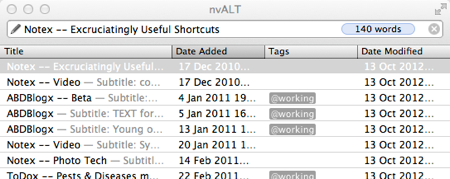Funny how things work. Patrick Rhone recently celebrated the 8th anniversary of his ongoing relationship with Notational Velocity, a mind-bogglingly simple, and even more powerful, piece of software that just keeps everything I want findable. Like Patrick, I too use nvALT, the modern incarnation of Notational Velocity, every single day, and wouldn't be without it. In fact, it is what keeps me from even trying sexier solutions like Evernote. So I got to thinking: when did I discover NV? Maybe NV has the answer. But no.

Switching to nvALT and viewing the Date Added column (I normally don't show it, useless information) suggests my earliest note -- actually the one provided by NV's Zachary to speed its use -- is from December 2010. But I suspect that's when I discovered nvALT and moved everything over. At least, I think so. And since that time I've adopted a few additional tweaks to add a little more obvious order to the pile of notes.
So when did I get it? Probably after Patrick, and in any case this isn't a competition, it's a concerted admiration effort. I certainly wrote about it in 2007, and have delivered on my desire then to "make it routine". What's funny about that list of software, though, is that although I have changed the tools, the jobs, as ever, remain the same.
- Bookends is still my bibliographer.
- WriteRoom has vanished, to be replaced by ByWord.
- Clyppan replaced PTHPasteboard, which succumbed a couple of OS updates ago.
- And MarsEdit replaced ecto a while ago too.
I never did get around to either Quicksilver or DevonThink, and as far as I know I don't miss them. My other discovery is Markdown, which I think is what sent me to nvALT. That too is starting to become part of muscle memory, though needs a bit more work. The next tool I most feel the lack of is TextExpander, and I wouldn't be surprised to have it to hand within a month.1
-
I did, and I use it a lot. Also Alfred. But especially with TextExpander, I know I'm not using it to the full, with all those fancy bits for doing things with the clipboard. Still, I love both of them too. ↩
Webmentions
Webmentions
Webmentions allow conversations across the web, based on a web standard. They are a powerful building block for the decentralized social web.
If you write something on your own site that links to this post, you can send me a Webmention by putting your post's URL in here:
Comments